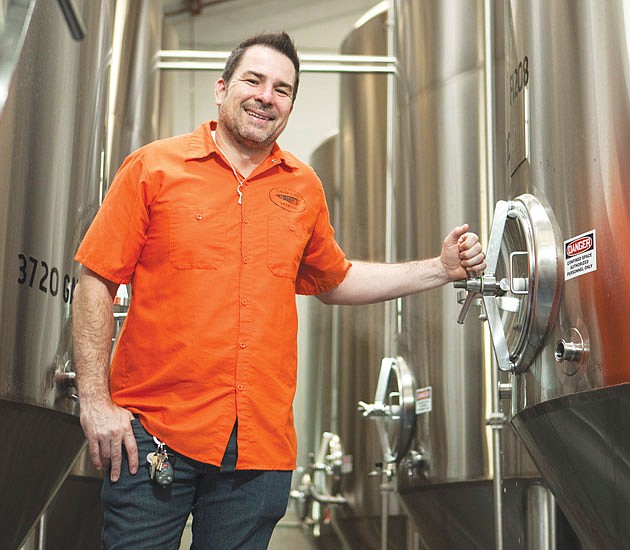- January 2, 2025
-
-
Loading

Loading

Cigar City Brewing's Joey Redner is the poster boy of craft beer in Florida. His brewery has grown from a startup brewery eight years ago to an expected sale of 1.37 million cases of beer this year across 10 states and Puerto Rico. Last year the company was bought by Colorado-based Oskar Blues Brewery, which in turn was bought by a private equity firm.
But press hasn't always been stellar for the company that led the craft beer craze in Florida and has served as a mentor to a handful of other startup breweries in the state. In fact, just a few years ago, the company had a lot of angry customers and took a $300,000 hit in an attempt to win back loyalty.
It was Cigar City's third annual Hunahpu Festival — a beer event where the brewery debuts its most famous limited-release beer — Hunahpu's Imperial Stout. For $25, eventgoers received a bottle of the beer and a ticket to the daylong beer fest.
Hunahpu's Imperial Stout had gained such a following that people were willing to pay four times its worth to get their hands on it. A lot of people would grab the beer at the event and then resell it on Craigslist for $100. People even decided to take advantage of the system by creating counterfeit tickets.
The festival that had around 300 attendees its first year was now attempting to run an event for thousands of people. They had planned on 3,500 attendees, but with the counterfeit tickets, there were more than 5,000 people trying to get in the brewery's gate.
Redner says the day started out well, but he started to realize that there were way too many people — more than they had sold tickets for. The company also was having issues with its ticket scanners, which was backing up the line to get in. They tried using an app that would scan the ticket, but it would drain a phone's battery after scanning just 50 to 60 tickets. “People were getting in that shouldn't be, people were schlogging through the ditch to get in. I had this miserable feeling,” Redner says.
There were around 150 people who weren't able to get the Hunahpu's Imperial Stout that they were promised. “To those people, it was a big deal,” Redner says.
The day ended in Cigar City shutting its doors early, and angry attendees pushing and shoving and chanting bad things about the brewery.
At the end of the day, Redner knew the festival didn't go as advertised. So he decided to take a $300,000 hit and refund everyone who paid for a ticket. “I just felt like we didn't execute, we didn't deserve that money anyway,” he says. “All you can do as a business owner is try and make amends,” Redner says.
“I looked at Hunahpu like I do a batch of beer,” Render says. If something isn't right with the beer, “you don't sell it, you dump it. It's cheaper to dump it instead of damaging the brand.”
Following the snafu with bogus tickets, Redner was ready to give up on the event all together. He figured it was too much to risk screwing up again.
The company was getting to a point where it was no longer small — it was turning into a scale brewery, or one that sells a lot of six-packs in grocery stories. It was getting more difficult to brew the smaller production beers and make it worth it, even though the limited release is sold at a high margin.
But his staff and the brewery's loyal fans persuaded him to try the event one more time. This time, Redner was going to do it right.
He hired Chris Lovett to oversee special events and marketing. Lovett was the perfect hire because he had a “take-no-s*#t kind of attitude,” Redner says. It was admittedly one of Redner's flaws — always trying to find a way to accommodate people who said they lost their tickets. With Lovett, the mood changed to, “You are going to follow all the rules or you're not going to be allowed in the door,” Redner says. “The way I had done it at the scale that it was, wasn't going to work.”
Redner also hired tech companies to help with ticketing and staffed up to make sure that they'd be prepared to handle the crowds.
Perhaps most interesting, he decided to shrink the size of the event. After a post mortem of the failed Hunahpu's Day and all previous events, Redner and his colleagues decided their best festival was in 2011, when they had between 3,000 and 3,500 attendees. They realized this was the best balance of how many people they could accommodate, regardless of how many people wanted to come.
The company did one more Hunahpu's Day at the brewery (which went well), but it realized there was more demand than space. “Moving offsite was a tough decision to make,” Redner says, though he acknowledges “it was probably more nostalgia and emotional for me.” Last month, the company hosted its second offsite.
Cigar City also shifted the focus of the festival to be on the breweries that would share their rare beers from Russia, Estonia and California, which was getting “lost in the shuffle of the beer release,” Redner says. It offered the bottles of Hunahpu's Imperial Stout as people were leaving.
Though some of the changes are bittersweet, Redner knows they were necessary for the marketing event to survive at scale. What started as a chill event populated by beer geeks had grown much bigger. “You have to make accommodations for the reality of what you're facing,” he says.